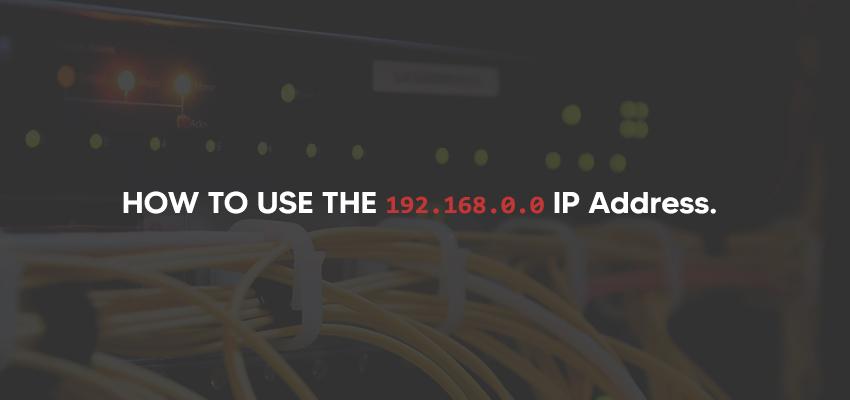
How to use the 192.168.0.0 IP Address.
Posted June 19, 2020, 5:16 a.m. by Emil S.192.168.0.0 is the start of the Private IP address range. This includes all IP addresses through 192.168.255.255. This IP address is uncommon on a network. It is not designated to a phone, or a computer wouldn’t be assigned this address.
So, why is it important to know about the 192.168.0.0 address? Well, let’s put it this way. For example, you reside in an apartment building or a condominium unit. You’re sitting on your couch while waiting for a package to arrive. The delivery person would need to know how to get to you.
But how is he able to do that? You are just one of the many residents of your particular building. While the building itself has its address to identify itself, it still consists of many units in it--one of these units is where you live.
With this explanation in mind, 192.168.0.0 is like the address of your apartment building, combined with your unit number. This address works like your very own apartment number. It enables people who are connected to the Internet to share one IP address.
Why Is This Not Used On Most Devices?
Unceasingly, every Internet Protocol network uses a range of addresses. It designates the whole network using the first address number in the range. You will notice that these network numbers almost always end in zero.
After being assigned as a network number, an address like 192.168.0.0 practically becomes ineffective for any other use. If this gets designated to a device on your network as a Static IP address, your network stops operating unless you take that device offline.
In a sense, this can serve as a device address provided that a network has been set up using an extensive address range. However, the additional work of managing these subjects and networks is impractical even though it is possible, technically speaking. This is the reason why you almost never see devices with IP addresses that end in zero—except for 0.0.0.0.
0.0.0.0, sometimes labeled as an unspecified address, is a placeholder address. Keep in mind, though, that this address isn’t routable.
The Size Of The 192.168.0.0 Network
How big is this network? Well, the size would primarily depend on the network mask. Check out the examples below:
- 192.168.0.0/16 – This ranges between 192.168.0.0 and 192.168.255.255. It has 65,534 possible hosts.
- 192.168.0.0/18 - This ranges between 192.168.0.0 and 192.168.63.255. It has 16,382 possible hosts.
- 192.168.0.0/24 - This ranges between 192.168.0.0 and 192.168.0.255. It has 254 possible hosts.
Broadband routers at home, which run within the 192.168.0.0 network, usually have 192.168.0.0/24 as its configuration. It typically uses 192.168.0.1 as a local gateway address. This enables your network to designate a maximum of 254 devices with a valid IP address. While this seems to be a high number for home networks, based on configuration, it is possible.
These home networks are limited and can only cater to up to a certain number of devices. Moreover, particular networks that connect more than five or even seven devices at the same time usually go through less optimal performance. This issue occurs because of massive bandwidth sharing and signal interference.
How Does 192.168.0.0 Work?
The notation of your IP addresses converts these binary numbers. Computers can then convert this into a form that is readable by humans. Check out the example below to see the corresponding binary number to 192.169.0.0:
11000000 10101000 00000000 00000000
Due to this being a private IPv4 network address, other connections or ping tests from the outside networks or the Internet cannot be routed to it. This address is used to route tables as a network number. Also, it enables routers to communicate with each other by sharing information on the network.
192.168.0.0 alternatives
If you don’t prefer using this address, you can also utilize other addresses that end in zero. Typically, home routers get installed on the 192.168.1.0 network and not on 192.168.0.0. What this means is your router might have 192.168.1.1 as its private IP address.
Furthermore, you have to note that the Internet Assigned Numbers Authority reserves the blocks of IP address space for private internet use. Here are the IP address blocks:
- 172.16.0.0 up to 172.31.255.255
- 192.168.0.0 up to 192.168.255.255
- 10.0.0.0 up to 10.255.255.255
